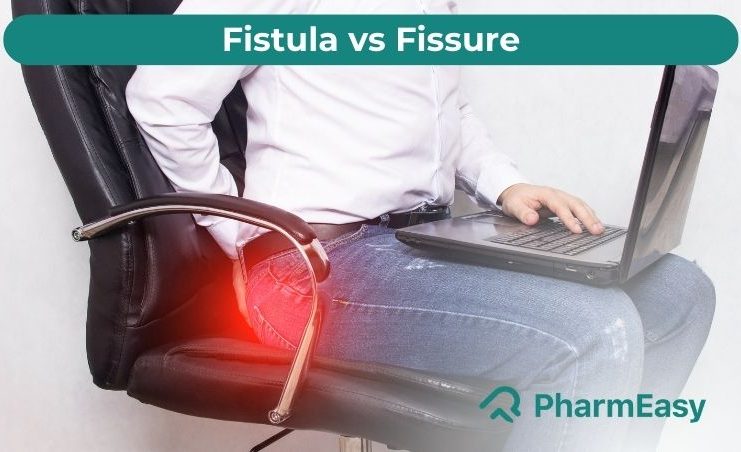Difference Between Fissure and Fistula
By Saksham Bhatia +2 more

Get more insightful and
helpful tips to
treat Diabetes for FREE



Download PharmEasy App




Register to Avail the Offer
Send OTPBy continuing, you agree with our Privacy Policy and Terms and Conditions
By Saksham Bhatia +2 more
Table of Contents
Fissure is a minute cut or tear on the delicate skin lining of the anus. It can happen due to the passing of hard stools and can result in severe pain and bleeding during bowel movements. Anal fissures commonly occur in young infants but may affect people of any age.

An anal fistula is a small tunnel-like structure or passageway which connects an infected gland located in the deeper layers of the anal region and extends to open somewhere in the soft tissue lining of the anal opening. It can cause significant pain, fever and swelling around the anus.
| Different Factors | Fissure | Fistula |
| Causes | The common causes of anal fissures to include:Straining to pass hard and large stoolsPregnancyConstipationChronic diarrhoeaAnal intercourse | Fistula may develop due to:Infection in the anal glandAbscess around anal regionRadiation therapy or treatment of anal cancerTraumaConstipationDiarrhoea |
| Symptoms | Severe Pain during bowel movements and after, lasting up to several hoursA visible crack in the lining of anusBlood on stools or toilet paper after wiping anus | Redness and inflammation around the tunnel openingA small opening around the anusDischarge of blood, pus, from the anal openingPain in rectum and anus while passing stoolsFoul smell from anal regionFever |
| Diagnosis | Physical examination to check for the cut or tear, which is often visible around the anal opening. | Clinical examination and Imaging tests like MRI and Fistulogram may be advised. |
| Treatment options that can be advised by doctors | Externally applied medications can be prescribed. Deep and chronic fissures usually require surgical treatment. -Surgery for fissure is known as lateral internal sphincterotomy (LIS), in which a small part of the anal sphincter muscle is cut to reduce spasm and pain.Laser surgery for anal fissures | Medicines for local application or oral medications to relieve pain and manage infection.Fistulotomy is done by removing the infected tunnel along with it’s lining, cleaning it well and allowing it to heal.Fibrin glue and collagen plug to clean and seal the tunnel post-surgery.Seton placement into the fistula to drain the infection and contents inside the tunnel. Endorectal advancement flap uses a flap from the rectal wall to cover the fistula.LIFT, a two-stage treatment in which the fistula tunnel is opened, then the infected tissues are removed and the fistula is tied off. |
| Prevalence | Anal fissures are more common in young infants. Women are more prone to anal fissures after childbirth. | Anal fistulas are common in adults around the age of 40 and develop more often in males than in females. |
| Complications if left untreated- | Failure to heal within eight weeks means it is considered chronic and needs further treatment.Recurrence. You are prone to having fissures if you had it previously.A tear that extends to the surrounding muscles. It delays the healing of anal fissures which causes discomfort and may require medicines or surgery. | A recurring fistula or an abscessIncrease in the length and number of tracts Inability to control bowel movements (faecal incontinence).Sepsis or infection that spreads throughout the bodyPeritonitis. An intestinal fistula may cause inflammation and infection of the peritoneum (membrane lining the abdominal cavity).There is a small risk of developing cancer in the fistula tract if left untreated for a long period of time. |
There are chances that you may confuse the symptoms of the two conditions, fissures and fistula. It is advised that as soon as you notice any of the above-mentioned symptoms, you must book an appointment with the doctor to get your condition diagnosed. Remember that timely diagnosis and proper treatment are required if you want to avoid further complications. A doctor will help you understand the difference between a fissure and a fistula and shall discuss the best possible treatment for you. Prompt treatment will ensure that you no longer experience pain and other symptoms. Never try to self-medicate for either of these conditions.
Disclaimer: The information provided here is for educational/awareness purposes only and is not intended to be a substitute for medical treatment by a healthcare professional and should not be relied upon to diagnose or treat any medical condition. The reader should consult a registered medical practitioner to determine the appropriateness of the information and before consuming any medication. PharmEasy does not provide any guarantee or warranty (express or implied) regarding the accuracy, adequacy, completeness, legality, reliability or usefulness of the information; and disclaims any liability arising thereof.
Links and product recommendations in the information provided here are advertisements of third-party products available on the website. PharmEasy does not make any representation on the accuracy or suitability of such products/services. Advertisements do not influence the editorial decisions or content. The information in this blog is subject to change without notice. The authors and administrators reserve the right to modify, add, or remove content without notification. It is your responsibility to review this disclaimer regularly for any changes.

Leave your comment...
Comments